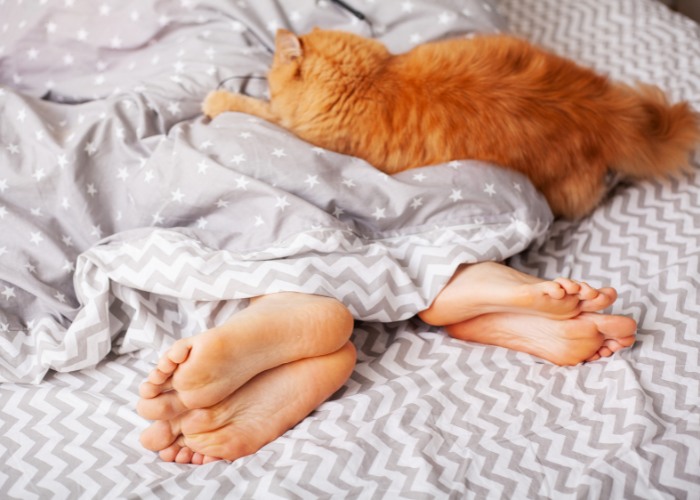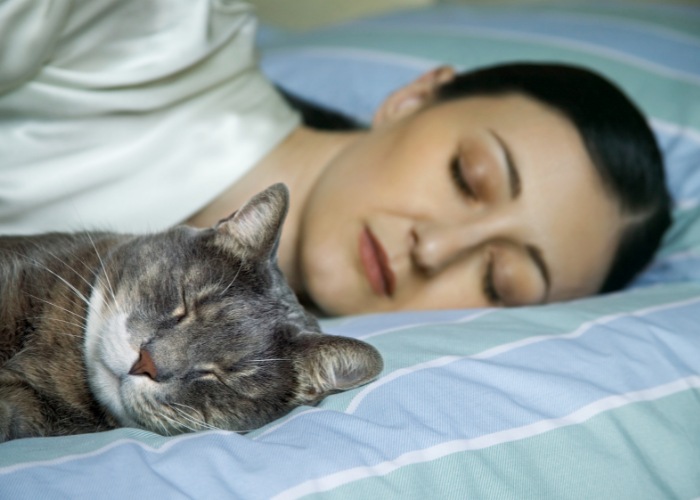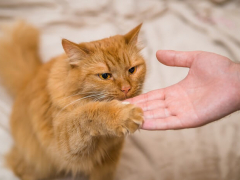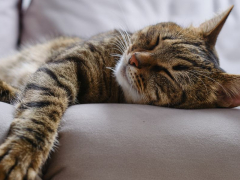
Curling up with a cuddly cat sounds like a picturesque way to spend the night. Encouraging your cat to sleep in your bed every night, however, might not be a simple decision.
There’s a lot to think about before you start sharing the sheets with an animal that may or may not attack your toes beneath the blankets.
A feisty feline might make wiggling your feet a risky move, and you might wake up to paws on your face, but any cat person will tell you that there’s a long list of benefits to regularly sleeping with a cat.
If you’re willing to accept the occasional sneak attack alarm clock or the sounds of biscuit making late into the night, you might improve your overall bond with your cat and both start and end your day with a cat-induced smile.
If you’re not sure whether to sleep with your cat at night, consider these potential benefits.
Maximum Relaxation
When you consider the fact that a recent study uncovered that nearly 50% of pet owners love their animals more than their human partners, it’s easy to see how sleeping with a cat makes a person feel completely relaxed. This awkward truth might cause a little jealousy, but cats can’t help the fact that their mere presence has been proven to reduce stress and lower heart rates.
These fluffy loves of our lives never nag about the dishes in the sink or ask about an unpaid bill. Instead, their soft fur and rhythmic purring lulls us into a state of pleasant reprieve. Countless studies have shown that petting a cat can lower cortisol levels and immediately make a person feel more relaxed.
Better Sleep
By letting yourself drift into relaxation before falling asleep, you set yourself up for a better night’s rest. It’s so easy to climb into bed with your mind still reeling about the day’s events.
You think about the problems you left unsolved and relive the awkward moments you’d rather forget. But when you sleep with your cat, their comforting presence helps your brain slow down.
As your heart rate calms and your mind shifts to the feeling of fur beneath your fingers, you allow yourself those essential moments of peace. Going to bed when you’re stressed or anxious can lead to restless sleep and even bad dreams. But by sleeping with your cat, you nod off to sleep with a clear mind and relaxed body.
Improved Health

We tend to discount sleep, but there are few things more important than getting good rest on a daily basis. Evidence shows that the better you sleep, the better your health. Dr. Kenneth Wright, Jr. of the University of Colorado stressed the importance of sleep in connection to overall health in an interview with News in Health.
He said, “There are certain repair processes that occur in the body mostly, or most effectively, during sleep. If you don’t get enough sleep, those processes are going to be disturbed.” Quality sleep is often one of the first things we sacrifice when life gets busy, but that habit can be detrimental to overall health. Instead, pet people can prioritize a good night’s rest by sleeping with a beloved cat.
Of course, as crepuscular creatures, not every cat will be willing to bunker down for your full eight hours. But if you have a feline friend who’s willing to keep you quiet company while you snooze, they could be the key to maintaining good health.
Safety First
As people-friendly predators, cats have a few instincts that make them excellent at sounding the alarm when danger is near. Dogs usually get all the credit for their protective nature, but having a cat in your room can be just as effective. Cats can hear much higher pitches than humans and even dogs. Their large ears can pick up sounds you wouldn’t notice even if you were awake.
Their eyes are also better equipped to spot suspicious movements in low-light environments. Their pupils expand wider than a human’s eye to let in more light, and the higher number of rods in their retinas gives them the ability to see with about one-sixth the amount of light that a person would need.
These biological advantages are put to good use when the house is dark and you’re trying to sleep. You can sleep soundly knowing that if something happens, your cat will be ready to sound the alarm.
A Stronger Bond

If you want to have a strong bond with your cat, it’s important to spend time together. The minutes you spend twitching a feather wand are essential but don’t underestimate the power of a good cuddle. By getting cozy with your cat in a quiet, calm environment, you show your pet that you are their safe place.
You can both find comfort in quiet companionship and connect on a deeper, emotional level. Most people who sleep with their cats agree that the time spent snuggling improves their overall bond.
Weighted Blanket
If you let your cat sleep in your bed, you accept the fact that they might decide that your stomach, legs, or even head are more comfortable than your mattress. Some cats prefer to sleep at the foot of the bed and be close enough for comfort but not actually touch their slumbering human. But others are more like Velcro, and they insist on staying close.
If you have one of these clingy cats, consider the benefits of letting that furball have its way. People spend big money on weighted blankets to help them sleep better. Having a cat, however, can be just as good.
Weighted blankets are popular because they can help you fall asleep faster, sleep deeper, and fight things like anxiety and even restless leg syndrome. The good news for cat people is that a 10-pound tabby can be just as effective.
Fight Loneliness
We all know that having pets can help prevent loneliness. Anecdotal evidence shows us this every day, but now even scientists are urging people to adopt cats as a way to fight isolation and loneliness.
Researchers sponsored by the All-Party Parliamentary Group on Cats reported in 2020 that owning a cat is a powerful way to support mental health. Cats help people who struggle with feelings of despair and loneliness. Allowing your cat access to your room at night is a great reminder that you’re not alone.
Pick Your Battles

Lastly, sometimes sleeping with your cat is the easiest way to simplify your life. Some cats hate closed doors. They see those barriers as unfair restrictions within their territory. If you don’t want to listen to your cat meow, howl, and scratch at the door all night long, letting them sleep in your bed may be the path of least resistance.
You could probably train a dog to sleep in a crate or a dog bed on the floor, but cats aren’t usually as responsive to being told what to do. Even if they don’t stay with you all night, giving your cat the freedom to choose where they want to sleep will go a long way in keeping your cat happy. You’ll also feel a strong sense of satisfaction when they decide they’d rather be by your side than anywhere else in the house.
More To Consider
If you love your cat and feel you’d both benefit from a shared sleeping space, you’re not alone. However before you get too comfortable, there are a few other situations to consider. If you have asthma or allergies, sleeping with a cat can potentially aggravate those symptoms.
It’s also important to realize that not every cat will be happy to lounge sleepily and peacefully the entire night. Some cats will get up to patrol the dark house or succumb to the midnight zoomies. Lastly, it isn’t a good idea to sleep with your cat if you bedshare with an infant or toddler.
Countless pet people prefer to sleep with their cats, and they wake up well-rested to adorable furry faces. If you’re considering letting your cat in the bed, give it a chance!







